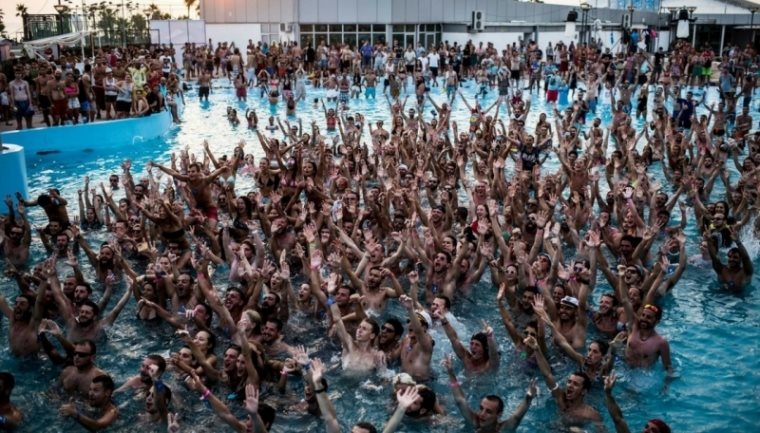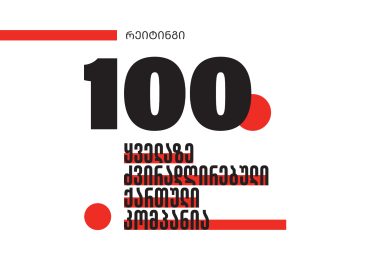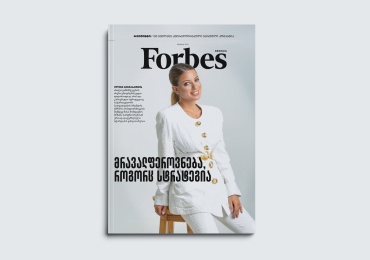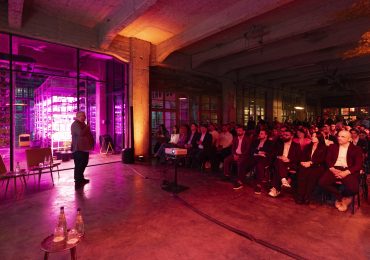Georgia’s much-ballyhooed GemFest was meant to be a celebration, but it quickly turned into a tragedy. The festival was organized within the framework of the state funded “Check–in Georgia”program,a two-year undertaking, and suspiciously received ₾50 million from the state budget.
₾4.01 million – that is the total sum allocated out of the state budget for GemFest 2017. This figure is more than a fifth of the ₾20 million paid by taxpayers to fund the government’s Check– in Georgia program in 2017. Not all of the cultural events planned within the framework of this project have been exhausted. Therefore, government officials have refrained from making any analytical assessments. Nevertheless, it is generally known that they would much rather spend the money than estimate the impact of the expenditure.
In an effort to weigh the pros and cons of this project, we started by contacting the founder of GemFest Giorgi Sigua, since his festival is second only to the recent Aerosmith concert in terms of expenditure(₾5.5 million) from the state budget.
“I have nothing new to say about it. We are still on ice, suspended and delayed,” wrote Sigua in a Facebook chat interview, noting that the financial losses incurred by GemFest 2017 was his mistake.
“I thought that everyone else believed in the possibility of building a world-class resort in Anaklia like I did. I was not thinking only about the festival. You cannot develop a resort by organizing a 4-5-day event. If my priority had been to make a financial profit, I would have planned a 3-4-day festival. In that case, the proceeds would have been the same, while the expenditure would have been 10 times less. I would have put money in my pocket and just walked away. However, I was totally obsessed with the idea of a new Ibiza in Samegrelo, near the border with Abkhazia. A lot of people were excited at the prospect…What’s done is done,” says Sigua.
One might not attribute much importance to the phrase “what’s done is done” had GemFest 2017 been entirely financed by the private sector. However, after the initial ₾1.9 million was allocated for the festival, it later grew to ₾4.01 million. State agencies are reluctant to talk openly about the government’s decision to increase the subsidy for the festival, which happened to be founded by the former head of the Georgian National Tourism Administration (GNTA).
“I cannot discuss these details at the moment. However, this information will be made public after completion of the Check-in Georgia project,” noted Head of the GNTA, Giorgi Chogovadze, who neither denies nor confirms whether the state will continue to support the GemFest.
Sigua is rather harsh when the conversation shifts back to the ₾4.01 million spent using funds drawn out of the state budget. He quickly points to Black Sea Arena Ltd., the entity that the GNTA transferred the funds allocated for the festival to.
Information procured from behind the scenes suggests that millions of additional laris were required by the organizers of GemFest 2017 to pay the artists’ fees. Sigua confirms that the state (namely Black Sea Arena) paid the fees of 120 of the 500 total artists for this year’s festival. Thus, he firmly reiterates that he “did not have access to a single penny of this money.”In spite of that, Sigua was summoned for questioning by the Investigative Service of the Ministry of Finance on several occasions. The Ministry of Finance does not exclude the possibility of further discussing Mr. Sigua liability in this regard.
However, Sigua has his own complaints against the investigative service. By his own account, this body of the Ministry of Finance conducted a search of the GemFest office only a few hours after the conclusion of the festival. During the search, all documents were seized. As such, Sigua has trouble remembering the exact data and figures and is reluctant to speculate about the numbers. He does note that during the one-month festival, Anaklia hosted over 30,000 local and foreign visitors and the project’s total cost was somewhere in the neighborhood of ₾17 million.
When I ask him about the employees left without pay and the dissatisfied renters, Sigua replied that he intends to cover all his financial obligations. On the other hand, Sigua has aired several grievances against the renters that have failed to pay him and who still owe Sigua around ₾1 million.
“We are dealing with a financial crime here. A lot of people went to GemFest in 2016, they enjoyed themselves to the fullest, indulged themselves with drugs, and the bars had good turnover, so Sigua decided to make this a one-month event and make a lot of money,” said Sonia Nikoladze, one of the renters and the events manager at Art Café Home.
Nikoladze did not like the idea of a thirty-day festival to begin with, but Sonia’s boss decided to take a risk and rent 800 m² on the festival grounds for₾17,000. According to the contract, they paid 25% of the rent up-front. However, they failed to pay the rest of the money.
“We only sold two bottles of water a day. How was I supposed to pay the rest of the money? Construction of the bar alone cost us ₾30,000. In addition, I hired six bartenders and paid each ₾70 per day. We also paid ₾6,000 in rent for the house that we lived in. Nearly 4,000 Iranians arrived on the first day of the festival, but they had their own bars and did not eat or drink at our place. After their departure, there was a total standstill. On August 3, 10,000 guests arrived to listen to the artist Solomun. We were excited, but it was all in vain. Everyone left the next day.
“Their sales did not go well. You cannot blame me for that,” Sigua told Forbes Georgia.
Nikoladze shot back.
“He does not understand that the organizers of the festival and the vendors are one family,” she pointed out angrily, noting that if the organizers of GemFest receive funding from the state budget again next year, she plans on organizing a protest.
There might be no need, since the investigative service is currently looking into the many issues related to GemFest 2017. Moreover, the government will most likely refrain from supporting the event since, in addition to the catastrophic financial losses that were incurred, a tragic incident (young girl died, allegedly due to drug overdose) transpired at the festival this past summer.
Even though the results of the examination have not yet been revealed, Sigua insists that so-called club drugs were not allowed on the premises of the festival. However, according to numerous guests of the festival, club drugs were readily available and easily accessible.
“You can smuggle drugs into a music festival by swallowing them. You can sneak drugs into any venue. No one sought my approval to sell drugs there,” Sigua counters, adding that he is ready to organize another festival next year without the support of the government, since GemFest has already become an international brand.
“There will certainly be a GemFest 2018. This time it will be a three or four or maybe even a five-day event. Soon we will announce the dates,” Sigua wrote.
I asked Sigua where the festival will take place and if GemFest could actually travel.
“I like the word travel,” he said, “it is directly linked to tourism,” he tells me, as I fire another question his way.
Does that mean there is a possibility that you will change the location for GemFest? I inquire.
“GemFest’s location is actually a website,” Sigua notes, as he sends me a link to the music festival.
He then tells me that he has received a few offers from abroad, but his only concern at this point is to retrieve all of his computers that were confiscated by the investigative service.
The renters who arrived in Anaklia for the festival are not the only ones that have levied complaints against Sigua. The managers of several Tbilisi-based clubs have their own grievances against him. Keta Gabunia, the founder of the club Mtkvarze, says that the funding of various festivals from the state budget, including GemFest, harms the market.
“Despite the draconian [drug] laws, Tbilisi-based clubs have become part of Europe. But while the international media refers to us as a ‘rising star’, the state continues to allocate millions of laris from the budget to fund such festivals and this puts the market in great jeopardy. The question is why? Just when we tell foreign artists that Georgia is a poor country that cannot afford to pay them big money and they agree to perform for less and a relationship is established with them, the state steps in and offers them inflated compensation from the budget and spoils it all,” Gabunia says.
Mtkvarze’s founder believes that when the state spends millions to support an electronic music festival, the goal is to make Anaklia more attractive. But this can only be achieved by ensuring the right conditions for business.
“When I offered to open my club ‘Stage’ in Anaklia, Sigua told me that I would have to pay ₾50,000 for the permit alone. As you can imagine, the costs would have been too high for me to see any profit in one month. Therefore, I turned down the opportunity. There is no such thing as a one-month festival anywhere in the world. Even in Berlin and Barcelona such festivals last only 3-4 days,” Gabunia explains.
The founder of the much talked about club Bassiani/Horoom, Naja Orashvili, is also opposed to the practice of state subsidized projects in the sphere of electronic music and she condemns the government’s unsound practice in this regard. She tells us that the scene suffered the greatest damage when certain groups of people began paying enormous sums of money to international artists in order to be included in music festival programs.
“GemFest played a major role in this by giving tenfold honorarium payments to the headline musicians, while paying the local DJs with free passes or not paying them at all. Needless to say, this interferes with the work of the promoters that are negotiating with agencies for a discount in view of the economic situation in our country. In spite of our three-year objection, millions of laris were spent on the festival and so far, the state has not taken responsibility for this fiasco,” notes Orashvili.
She explains that in addition to all of this, there is much ambiguity surrounding the €741,360 contract between Black Sea Arena Ltd. and the company Pet Plus.
“It is impossible to find the promotional company Pet Plus on Google. This gives us grounds to suspect that this intermediary company was used for financial machinations,” Orashvili adds.
Industry insiders believe that the inflated budget and the presence of an inept promotion company raises the suspicion and likelihood of the existence of shady financial manoeuvring, since the sums indicated in the contracts signed with some artists are ten times larger than the actual market price.
Orashvili believes that club tourism was developed by those very clubs that finance GemFest by paying taxes, while the representative of GemFest did not even bother to offer condolences for the tragedy that took place on his premises.
Orashvili, Gabunia and the technical manager of AlterVision Group, Sandro Sulakvelidze, all tell me the same story regarding a meeting held at the chancellery last December. During the meeting the private sector offered the government various models for the effective implementation of the Check-in Georgia program and were given promises that contests would be announced for all musical events and that all promotional companies and private individuals would be given an opportunity to participate. That promise was never kept.
“There was no announcement of a contest and various companies split the budget unfairly. It is impossible to ensure a healthy competitive environment in the presence of state-subsidized projects. That is exactly why the implementation of erroneous state policies over the past several years, namely the preferential approach practiced by the Ministry of Culture, as well as the Check-in Georgia project, has placed many private companies in a financially damaging situation,”explains Orashvili.
Sulakvelidze and his AlterVision Group also believe that the continuous subsidization of commercial festivals not only hinders the development of the club and festival industry, but it also harms the image of the country. Sulakvelidze underscores examples of some of the shortcomings identified during GemFest 2017.
“Bars were left financially crushed and their staff unpaid. No one speaks about it officially, but some musicians who headlined the festival have not received their payments yet. These circumstances can harm the reputation of Georgia and impede negotiations with foreign artists for companies like ours,” notes Sulakvelidze.
When I got back to Giorgi Sigua, informing him of the grievances aired by the private sector, Sigua insists that the headlining artists invited as part of the GemFest were financed by the government and therefore represent a totally different segment.
“We are not a club. As a matter of fact, we don’t own a club as it is. Hence, how can clubs situated in the centre of Tbilisi and the festival located in village on the outskirts of Samegrelo intersect?” Sigua asks rhetorically.
The organizers of Check-in Georgia remain reluctant to scrutinize the complaints made by representatives of the club and the festival industry, and Giorgi Chogovadze tells us that no one has aired such grievance with him.
“Probably when the project is over, we will all sit around one big table and discuss the pros and cons of it. We will listen to all that the private sector has to say about it,” he says, pledging that the group that is involved in the planning of Check-in Georgia 2018 will definitely take into account all comments and recommendations provided by the business circles.
The private sector position is unanimous and remains unchanged from the previous year – the state must stop subsidizing such events, especially given the fact that the efficiency of multi-million lari projects is not measured in numbers and the goal of Check-in Georgia as declared on the official website – “to make Georgia a cultural center and attract a large number of tourists”is just that – words.
Simple statistics indicate that a total of 73,420 tickets were sold for three major events – the Eros Ramazzotti, Robbie Williams and Maroon 5 concerts, all of which held within the framework of Check-in Georgia 2016, and only 2,958 tickets out of the total were purchased from abroad (tourist companies bought only 1,071 tickets).
At the end of the day, Check-in Georgia 2017 has still not yet fully run its course. But the GNTA has already allocated ₾13,236,700out of the total ₾20 million that was earmarked for the project. ₾12 million of which, was transferred to Black Sea Arena Ltd, including the ₾4,010,000 contributed to the Gem Festival.
Autumn has arrived and we will soon have to count how many hundreds of visitors ‘checked-in’ by virtue of the overpriced subsidy, which had only one justification –“to attract a large number of tourists”.

















